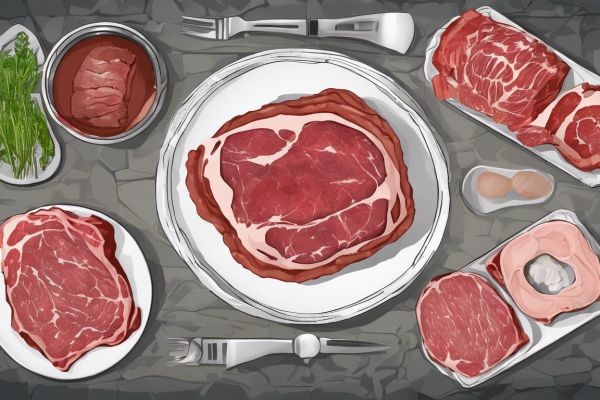by - L. Richardson
The globalist agenda to replace traditional Meat with lab-grown alternatives is a deceptive and dangerous ploy. Behind the facade of cruelty-free "meat" lurks a sinister truth – the biotech industry's quest for proprietary control over our food supply. The lab-grown meat conspiracy seeks to undermine absolute meat sovereignty, perpetuating cancerous immortal cell lines masquerading as ethical choices.
This exposé delves into the disturbing realities of lab-grown Meat, unmasking the corporate monopoly's resistance against transparency. From the ethical minefield of immortalized cell lines to the regulatory void enabling deception in meat labeling, we unveil the alarming dangers of synthetic proteins and the urgent need to safeguard our right to natural, unadulterated sustenance.
The Claim of Cruelty-Free Meat
The Deceptive Narrative
The biotech industry's claim of "cruelty-free" lab-grown Meat is a carefully crafted deception designed to obscure the harsh realities of its production process. While the marketing narrative paints a picture of ethical and humane alternatives, the truth is far more disturbing.
The Fetal Bovine Serum Conundrum
- An essential ingredient in the manufacture of lab-grown Meat is fetal bovine serum (FBS), a substance extracted directly from the hearts of cow fetuses, often while they're still alive, on the slaughterhouse floor.
- Despite the minuscule quantities used in each batch of lab-grown chicken, using FBS means that slaughter is an integral part of the process. Thus, although no chickens need to be slaughtered, pregnant cows and their calves become collateral victims.
- This inconvenient truth is a problem that manufacturers of lab-grown Meat deliberately avoid discussing, as it undermines their carefully curated image of cruelty-free sustenance.
The GOOD Meat Paradox
GOOD Meat, the lab-grown meat division of Eat Just Inc., recently received FDA approval to bring its first alternative meat product to market in the United States. However, a closer examination of their filing reveals a startling paradox:
Key Player / Role
GOOD Meat (Eat Just Inc.) / Manufacturer of lab-grown Meat
JOINN Biologics / Integral to production and quality control
- JOINN Biologics, a China-linked firm, produces chicken cells in a dedicated manufacturing suite in Richmond, California.
- They ensure the raw materials, including the controversial fetal bovine serum, are of suitable quality and mitigate food safety risks.
This symbiotic relationship between GOOD Meat and JOINN Biologics exposes the inherent contradiction in the "cruelty-free" narrative, as the use of FBS remains an inescapable reality.
Immortalized Cell Lines: The Elephant in the Room
The Sinister Truth Behind Immortalized Cell Lines
The lab-grown meat industry's deafening silence on the use of immortalized cell lines speaks volumes about the disturbing truth it seeks to conceal. These cell lines, derived from cancerous tumors, are the backbone of the industry's operations. Yet, their use is shrouded in secrecy and obfuscation.
- The HeLa Legacy
- The first immortalized cell line, the infamous HeLa line, was extracted from the cervical cancer tumor of Henrietta Lacks, an African-American woman, without her knowledge or consent.
- While not all immortalized cell lines used in lab-grown meat production are cancerous, many are derived from cancerous cells, raising ethical and health concerns.
- The Unspoken Embarrassment
- Industry giants like Upside and GOOD Meat have served lab-grown Meat to the public after receiving regulatory approvals. Yet, they adamantly refuse to discuss their use of immortalized cell lines.
- This evasiveness is a tacit admission of the industry's discomfort with the subject, as it undermines the narrative that lab-grown Meat is a safe and ethical alternative.
Immortalized Cell Line / Derived From / Used By
HeLa / Cervical cancer tumor / Research and commercial applications
CHO (Chinese Hamster Ovary) / Hamster ovary tumor / Biopharmaceutical and food production
HEK293 / Embryonic human kidney cells / Biopharmaceutical and food production
- The Ethical and Regulatory VoidThe use of immortalized cell lines in food production raises significant ethical concerns, as it involves the exploitation of human and animal cells, often without consent.
- Regulatory bodies have not established clear guidelines and safeguards for using these cell lines in food production, leaving consumers vulnerable to potential health risks and ethical violations.
The lab-grown meat industry's reluctance to address the elephant in the room – using immortalized cell lines – is a glaring red flag. It exposes the industry's willingness to prioritize profits over transparency, ethical considerations, and consumer safety.
Corporate Control and Proprietary Ownership
The Monopolistic Agenda
The true motive behind the lab-grown meat industry's push is not a noble pursuit of ethical sustenance but a sinister corporate control and proprietary ownership agenda. By transforming food into a patentable commodity, these biotech giants seek to consolidate their monopolistic grip over the very essence of life – our nourishment.
- The Path to Ownership
- Traditional meat production is decentralized, with millions of farmers and ranchers contributing to the global food supply.
- Lab-grown Meat, however, is a tightly controlled industrial process, enabling corporations to patent and monopolize the production methods, cell lines, and even the final product itself.
- The Slippery Slope
- The precedent set by introducing genetically modified organisms (GMOs) and the corporatization of the American food system serves as a chilling warning.
- Once lab-grown Meat gains a foothold, these corporations will leverage their proprietary ownership to dictate what we consume, how it's produced, and at what cost.
The Illusion of Choice
Traditional Meat / Lab-Grown Meat
Decentralized production / Centralized corporate control
Unpatentable / Patentable processes and products
Diverse sources / Monopolistic supply chain
The lab-grown meat industry's deceptive marketing portrays an illusion of choice. Still, it is a calculated step towards stripping consumers of their sovereignty over food. As these corporations tighten their grip, food freedom will become a distant memory, replaced by a dystopian reality where profit-driven conglomerates dictate our sustenance.
Ethical and Regulatory Concerns
The Ethical Quagmire
The production of lab-grown Meat is mired in a complex web of ethical concerns that cannot be ignored. From exploiting human and animal cells without consent to the potential health risks associated with immortalized cell lines, the industry operates in a regulatory void that leaves consumers vulnerable.
- The Consent Conundrum
- Many immortalized cell lines used in lab-grown meat production, such as HeLa and CHO, were derived from human and animal cells without the knowledge or consent of the individuals or animals involved.
- This raises significant ethical questions about the commodification of biological materials and violating bodily autonomy.
- The Health Hazard
- The long-term effects of consuming products derived from immortalized cell lines, which are often cancerous in nature, remain largely unexplored and potentially hazardous [1].
- The lack of comprehensive studies and rigorous safety protocols exposes consumers to unknown risks, making them unwitting participants in a vast, uncontrolled experiment.
Regulatory Vacuum: A Breeding Ground for Deception
Regulatory Concern / Impact
Lack of transparent guidelines / Enables deceptive marketing practices.
Absence of labeling requirements / Consumers need to be made aware of product origins.
Inadequate safety protocols / Potential health risks go unchecked.
The absence of robust regulatory frameworks governing the lab-grown meat industry is a glaring oversight that facilitates deception and undermines consumer trust. Without clear guidelines and stringent oversight, the industry operates in a regulatory vacuum where profit motives precede transparency and accountability.
- The Labeling Loophole
- In the absence of mandatory labeling requirements, manufacturers can obfuscate the true nature of their products, misleading consumers about the presence of lab-grown components.
- This deception denies consumers the right to make informed choices about their food, effectively stripping them of their sovereignty over their dietary preferences.
- The Safety Mirage
- The lack of comprehensive safety protocols and rigorous testing requirements creates a false sense of security, allowing potentially hazardous products to enter the market unchecked.
- This regulatory void jeopardizes consumer health and erodes public trust in the food system, undermining the foundation of ethical and responsible food production.
The Growing Resistance
As the lab-grown meat industry continues to expand its reach, a growing resistance movement is emerging, driven by concerns over ethical violations, health risks, and the consolidation of corporate control over our food supply. Several states, including Florida, have passed or are considering laws to ban the sale and production of lab-grown Meat, indicating a growing awareness of the implications of this technology.
This resistance represents a collective voice demanding transparency, accountability, and the preservation of consumer choice. It is a powerful reminder that pursuing profit and technological advancement must never supersede ethical considerations and the fundamental right to safe, unadulterated sustenance.
FAQs
What are the challenges associated with producing lab-grown Meat?
The production of lab-grown Meat faces significant challenges, particularly regarding the growth media—the nutrients needed for animal cells to proliferate. This media is highly refined and mirrors the processes used in pharmaceutical manufacturing, which can be complex and expensive.
Has McDonald's started offering lab-grown Meat in their menu?
Actually, McDonald's is expected to offer lab-grown meat products later. The main reason is the cost disparity, with lab-grown meat pricing around $17 per pound, compared to the 2023 average cost of traditional beef, which is $4.92 per pound.
Can lab-grown Meat be considered safe for consumption?
Lab-grown Meat is still being researched to understand its benefits fully. However, it can lower the risk of foodborne illnesses, is cruelty-free, and could be a more sustainable option than traditional livestock farming. In 2022, the FDA approved Upside Food's lab-grown chicken meat as safe for human consumption.
What are the benefits of consuming lab-grown Meat?
Lab-grown Meat, derived from stem cells, offers several advantages over traditional Meat. It requires significantly less land, produces fewer greenhouse gases, and provides the same taste as conventional Meat since it is actual Meat, not slaughtered animals. These factors make it a beneficial choice for humans, animals, and the environment.
References
- Recombinant Protein Technology | Synthesis Capital. https://synthesis.capital/pages/recombinant-protein-technology
- https://www.infowars.com/posts/everything-you-need-to-know-about-lab-grown-meat/
- https://banned.video/watch?id=64a86a20bc34b79e236c8ed9
- https://thenationalpulse.com/2023/05/16/revealed-the-curious-connection-between-lab-grown-meat-animal-cruelty-and-chinas-biowarfare-program/
- https://twitter.com/Babygravy9/status/1655967511769145346?ref_src=twsrc%5Etfw%7Ctwcamp%5Etweetembed%7Ctwterm%5E1655967511769145346%7Ctwgr%5E1f966250325dfbeebfd6a468ef55a881b80d1d1e%7Ctwcon%5Es1_&ref_url=https%3A%2F%2Fwww.infowars.com%2Fposts%2Feverything-you-need-to-know-about-lab-grown-meat%2F














